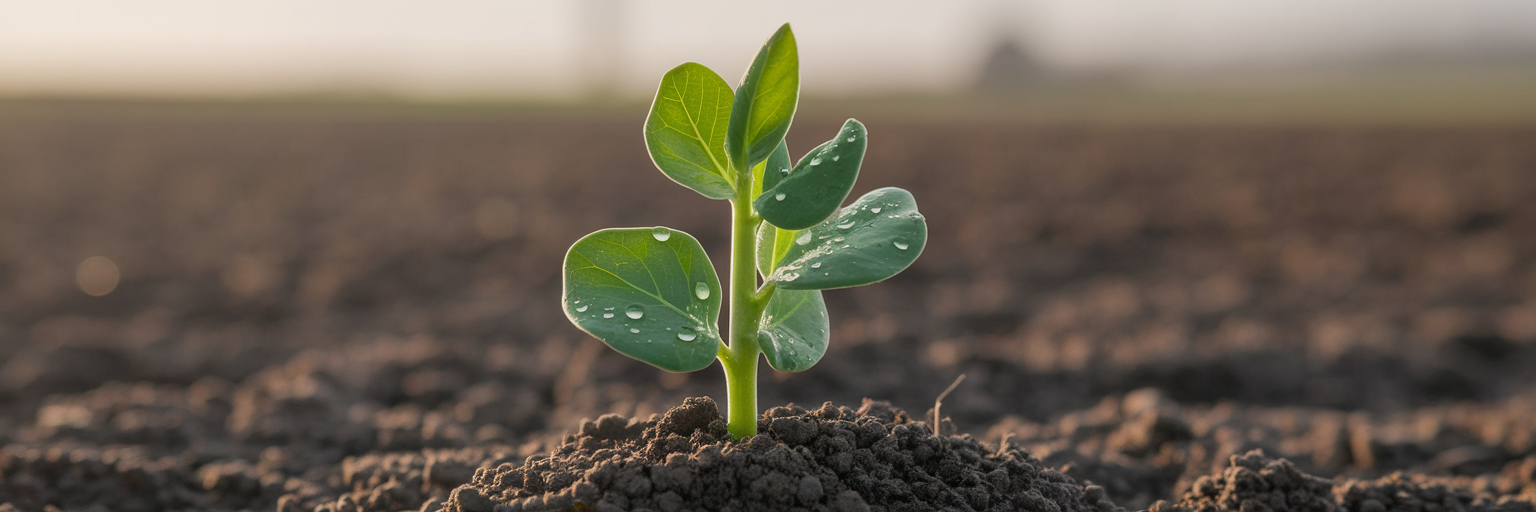The Real Footprint of Your Protein Shake
We often track macros, calories, and workout splits with precision, but what about the environmental cost of our nutrition? The global livestock industry is a massive contributor to greenhouse gases. According to the UN's Food and Agriculture Organization, it accounts for 14.5% of all human-caused emissions. That’s a staggering figure, and it means our protein choices have a direct impact that extends far beyond our personal health.
The carbon footprint of food isn't just an abstract term. It represents the total environmental toll of getting fuel from the farm to your shaker bottle. Think about the resources required for animal agriculture: the land cleared for grazing, the water consumed, and the emissions produced at every stage. The numbers paint a clear picture. Producing just one kilogram of beef can generate up to 27 kilograms of CO2.
Now, compare that to plant-based alternatives. A kilogram of pea protein creates only around 2.1 kilograms of CO2. This isn't a small difference. It’s a monumental shift. For any fitness enthusiast in the US looking to make a tangible difference, choosing sustainable protein sources is one of the most direct and empowering actions you can take. You don’t have to compromise your nutritional goals to lower your environmental impact. You just have to choose a greener fuel.
Saving Precious Land and Water with Every Scoop

The environmental cost of our protein isn't just measured by what goes into the atmosphere. It’s also about what we take from the ground and our rivers. Animal agriculture has an immense water footprint. To put it in perspective, producing a single pound of beef can require the equivalent of over 100 five-minute showers. It’s a difficult number to visualize, but it highlights a massive drain on a finite resource.
In stark contrast, plant proteins like lentils and peas need significantly less water to grow. This conservation is critical, but the story doesn't end there. Livestock farming is a leading driver of deforestation, clearing vast areas of vital ecosystems like the Amazon rainforest to make room for grazing. Plant-based agriculture is far more efficient, requiring just a fraction of the land to produce the same amount of protein. This efficiency helps preserve biodiversity and protect our planet's natural landscapes.
By opting for an eco friendly fitness diet, you are doing more than just making a personal choice. You are contributing to a more resilient and sustainable global food system. Every scoop of plant protein is a vote for preserving our natural resources. As you consider ways to build a more sustainable lifestyle, exploring the variety of our plant-based products is a great place to start.
| Metric | Beef | Pea Protein | Why It Matters for Fitness Enthusiasts |
|---|---|---|---|
| Greenhouse Gas Emissions (kg CO2e) | ~50 kg | ~1.1 kg | Choosing plants directly lowers your workout's carbon footprint. |
| Water Usage (Liters) | ~3,200 L | ~1,000 L | Conserves a critical resource needed for all life. |
| Land Use (Square Meters) | ~164 m² | ~2.2 m² | Protects forests and natural habitats from destruction. |
Note: Figures are global averages and can vary based on specific farming practices. Data is aggregated from sources including Our World in Data and academic studies to provide a clear comparative snapshot.
How Sustainable Farming Creates a Healthier Planet
While saving resources is a huge part of the equation, the way our food is grown matters just as much. Sustainable agriculture focuses on working with nature, not against it, to create a system that regenerates the environment. These aren't complicated scientific theories but practical methods that lead to healthier soil, cleaner water, and a more balanced ecosystem.
Some of these powerful techniques include:
- Crop Rotation: Instead of planting the same crop repeatedly, farmers alternate different plants in a sequence. This simple change naturally enriches the soil with nutrients, reducing the need for chemical fertilizers.
- Cover Cropping: In between cash crop seasons, farmers plant crops like clover or vetch. These "cover crops" protect the soil from erosion, improve its structure, and even pull carbon from the atmosphere back into the ground.
- Organic Farming: By avoiding synthetic pesticides and fertilizers, organic farmers keep harmful chemicals out of our waterways and off our plates. This protects local wildlife and ensures our food is as clean as possible.
These regenerative methods stand in sharp contrast to the industrial practices often seen in concentrated animal feeding operations (CAFOs). These facilities can create massive manure lagoons that pose a risk of polluting local water sources. As a consumer, your choice is a powerful signal. When you select vegan protein from brands committed to these practices, you are actively supporting a healthier planet. It’s a belief we hold deeply, and you can learn more about our story and commitment to sustainability on our site.
Fueling Performance with Plant-Powered Health Advantages

Let’s address the question every athlete asks: will I still be able to perform at my best? The answer is a resounding yes. Choosing vegan protein for athletes is not a compromise. High-quality plant protein powders and whole foods provide all the essential amino acids your body needs for muscle repair and growth. In fact, many of the world's top athletes are now powered by plants.
Beyond muscle synthesis, there's a long-term win-win scenario. Extensive research from sources like the Harvard T.H. Chan School of Public Health links plant-centric diets to lower risks of cardiovascular disease and type 2 diabetes. But one of the most immediate plant based protein benefits for athletes is its effect on inflammation. Many plant foods are rich in compounds that help reduce inflammation, which can lead to faster recovery times and more consistent training. Think about it: less soreness means you can get back to your workouts sooner and stronger.
This makes finding the best plant protein for muscle gain a strategic investment in both your immediate performance and your long-term health. It’s about fueling your body with clean, effective nutrients that support you today and protect you tomorrow. As we've explored in our article on effective supplements, the right fuel is fundamental to achieving your goals.
A Balanced View on Plant-Based Proteins
To build trust, it's important to have an honest conversation. One of the most persistent myths about plant-based diets is the idea of "incomplete proteins." While it's true that some individual plant sources might be lower in one or two essential amino acids, this is easily solved. A varied diet that includes different plant foods provides a complete amino acid profile. Classic pairings like rice and beans are a perfect example, and modern blended protein powders are specifically designed to be complete.
It's also fair to acknowledge that not all plant agriculture is perfect. Large-scale soy monocultures, when not managed with sustainable practices, can have their own environmental challenges. This honesty is important because it shows that the goal isn't blind praise but a genuine search for better solutions. We believe in transparency and continuous improvement.
The good news is that the field is constantly innovating. New proteins derived from fermentation are emerging, offering even better taste, texture, and sustainability. Despite some nuances, the overall environmental and health case for shifting toward plant-based protein remains overwhelmingly strong. It's easier than ever to get complete nutrition, and you can even find inspiration in some of our simple and delicious vegan recipes.
Making the Green Switch for Your Fitness
Choosing vegan protein is a powerful decision that benefits you and the planet. You’re lowering your carbon footprint, helping to conserve precious water and land, and giving your body clean fuel for better long-term health. It’s a choice that aligns your fitness goals with your values.
Getting started doesn't have to be complicated. Here are a few simple first steps:
- Start Small: You don't have to go all-in overnight. Try swapping one meal a day, like your post-workout shake, for a plant-based option.
- Fuel Your Next Workout: Grab a high-quality vegan protein powder for your next gym session. Pay attention to how you feel during recovery.
- Get Creative in the Kitchen: Explore new recipes that put plants at the center of your plate. You might discover your new favorite meal.
What's your favorite way to fuel with plants? Share this article with a fitness buddy and start the conversation. Ready to fuel your fitness the greener way? Explore our delicious and sustainable Chocolate Vegan Protein designed for athletes like you.



